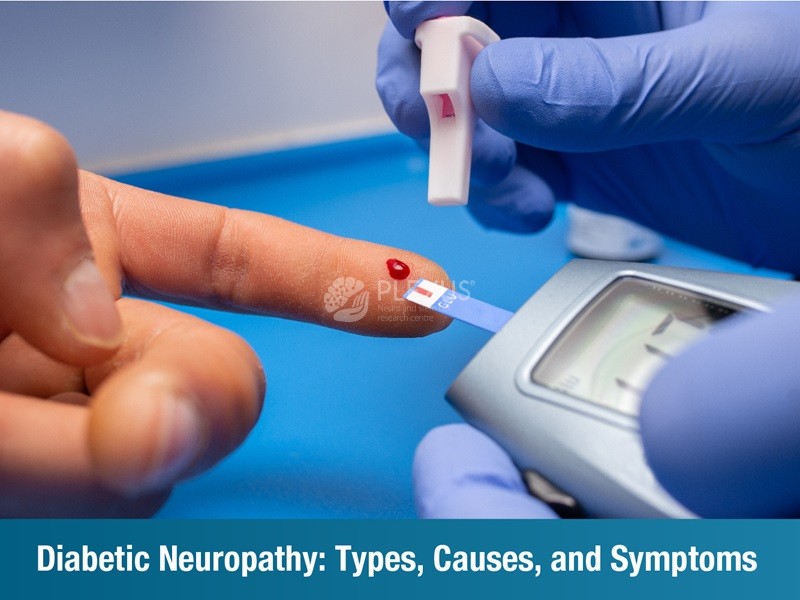
One of the most critical parameters for diabetes control is regulation of sugar consumption as high blood sugar levels can lead to nerve injuries throughout the body; this is known as Diabetic Neuropathy (DN). The condition damages the vasa nervorum (small arteries) that supply blood to the peripheral nerves. It mainly affects the legs and feet.
Diabetic Neuropathy can be managed (even prevented) by keeping a tight control on blood glucose levels and leading a healthy lifestyle.
In this blog, we’ll take you through the types, causes, and symptoms of DN.
Types of Diabetic Neuropathy
The five types of diabetic neuropathies are:
- Peripheral – affects the legs, hands, fingers and toes; caused by diabetes, injury, infection, or toxin exposure
- Autonomic – affects bowel and bladder function, sexual response, perspiration, and peripheral nerves; caused by damage to nerves in the involuntary nervous system
- Focal – can affect any part of the body leading to weakness in a bunch of muscles; caused by localised damage to a single nerve or a group of nerves
- Proximal – causes pain in the thighs, or buttocks, leading to weak legs; caused by damage to nerves and blood vessels surrounding the nerves
- Cranial – affects feeling and movement in face and eyes; caused by damage to any of the 12 cranial nerves in the brain
Autonomic neuropathy is the most severe type of DN. It is known to cause hypoglycemia unawareness.
Causes of Diabetic Neuropathy
Below are the various triggers associated with DN:
- Metabolic factors – For instance high glucose and fat levels in the blood, low levels of insulin
- Autoimmune inflammatory factors – Leading to nerve damage, and damaged blood vessels that supply oxygen and nutrients to the nerves
- Mechanical injury to nerves through trauma
- Genetics – Hereditary weakness to nerve diseases
- Excessive smoking
- Alcohol abuse
Symptoms of Diabetic Neuropathy
Depending on which system is affected by neuropathy, it can lead to pain, tingling, disability, or numbness in the extremities or to problems related to the digestive tract, the urinary system, kidneys, sex organs, blood vessels, or heart. The symptoms range from being absent to being mild, to being fatal or near fatal. Symptoms also usually take time to develop over years and the risk rises with increasing duration of diabetes; about 60-70% of diabetics have some or the other form of neuropathy, with the incidence being greatest in those with diabetes for 25 years and above.
The other symptoms of nerve damage (caused by DN) include:
- Wasting of the hands and feet muscles
- Diarrhoea/constipation
- Indigestion
- Nausea and vomiting
- Weakness
- Dizziness, fainting spells
- Bladder control and urinary incontinence
- Erectile dysfunction in men
- Vaginal dryness in women
Diabetic neuropathy symptoms in feet, legs, hands, and arms
- Tingling and numbness
- Unable to feel temperature changes
- Unable to feel pain
- Impaired coordination
- Shooting or burning pains (these may intensify at night)
Diagnosing Diabetic Neuropathy
DN can be diagnosed by checking muscle strength and reflexes, sensitivity to temperature, light touch or vibration and blood pressure and heart rate.
Managing Diabetic Neuropathy
Managing DN involves maintaining normal glucose levels to prevent further nerve damage. This can be achieved through a healthy lifestyle and being regular with diabetic medications or insulin. Additionally, patients with DN have also been able to manage their pain with anti-seizure medications, and several other complications appropriately with antidepressants.
Diabetic Neuropathy care at Plexus
While the symptoms of diabetic neuropathy may differ from person to person, living with these symptoms is uncomfortable for everyone. At Plexus, we help you manage your symptoms, provide relief from pain, and empower you to perform everyday activities with ease.
Our team of specialists headed by Dr Na’eem Sadiq, India’s foremost neurologist will devise a customised rehabilitation programme to help you manage neuropathy and its related symptoms.
If you wish to know more about neuropathy rehabilitation at Plexus or have a loved one suffering from diabetic neuropathy, then reach out to us today.
WhatsApp +91 89048 42087
Call +91 78159 64668 (Hyderabad) | +91 82299 99888 (Bangalore)
Remember, the best way to prevent DN is always maintaining your blood sugar levels in the safe range!










